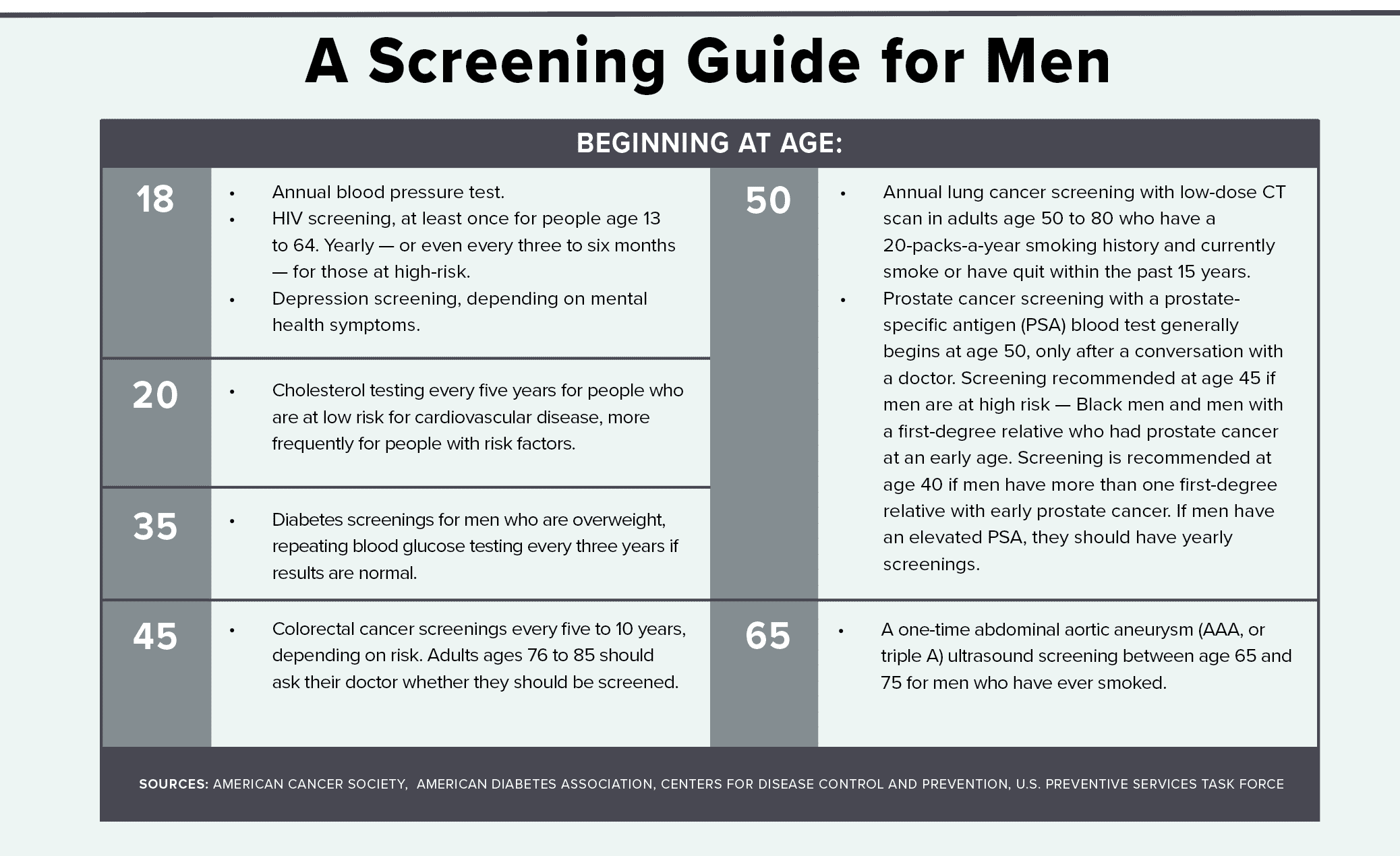While men may be reluctant to see the doctor, they should consider these important preventive tests
How do you think most men would rather spend their day: doing household chores, like cleaning the bathroom, or visiting the doctor?
Survey says: Most men (72%) would rather do a chore like scrubbing the floor than see their doctor. And 65% of men said they avoid going to the doctor as long as possible, according to a 2019 Cleveland Clinic survey.
Whether it’s due to stereotypical notions that strong men don’t ask for help, fear of a dire diagnosis, or for many other possible reasons, men commonly avoid doctor visits.
“Men of all races and classes will put off going to the doctor, even when they are having symptoms. It’s not in their DNA, or they haven’t had that example from other men,” says Carlos Crudup, MD, medical director and primary care physician at JenCare Senior Medical Center in Glenwood.
But preventive care — seeing a doctor for check-ups and screenings, rather than seeing a doctor to treat an established health issue — is important for men’s health.
“Men of all races and classes will put off going to the doctor, even when they are having symptoms.”
Common tests
Crudup urges men to be proactive about seeking medical care before they get sick. He encourages them to get preventive screenings and tests that can help them stay healthy and possibly extend their lives.
There’s no need to fear the tests. “Many of these tests and screenings are not invasive,” he says. Some screenings only involve blood tests.
Desler Johnson Javier, MD, who practices internal medicine at Advocate Illinois Masonic Medical Center in Chicago, says the type of tests and screenings a man should undergo depends on his age, symptoms, and other risk factors. Those risk factors include things like weight, smoking history, and cancer history in the family.
Screening recommendations are guidelines, Javier says; individuals should discuss specific screening decisions with their doctor.
Some common screening tests for men are:
- Prostate cancer screening. Prostate cancer screening measures the level of a particular protein (prostate-specific antigen, or PSA) in the blood. But the PSA test may produce false positive or false negative results, plus it may detect small cancers that aren’t life-threatening. The impulse may be to overtreat these cancers, but that may not be necessary. The American Cancer Society says that starting at age 50, men should talk to their doctor about the benefits, risks, and limits of prostate cancer screening. That discussion should start at age 40 or 45 for men at higher risk because of family history or ethnicity — Black men have a higher risk of developing more aggressive cancers.Most men will get prostate cancer if they live long enough. Some prostate cancers are more aggressive; others are more slow-growing and may not need treatment.
- Colorectal cancer screening. Recommendations for colorectal cancer screenings have changed in recent years. Now, screenings begin earlier, at age 45, because colon cancer is increasingly being detected in younger people.While a colonoscopy is the standard screening, at-home colon cancer tests that require a stool sample can be helpful, Crudup says. But “if a stool sample comes back positive for blood, a patient still needs a colonoscopy,” he adds.
People should begin testing earlier than 45 if they’ve had a close relative with colorectal polyps or colorectal cancer, have an inflammatory bowel disease such as Crohn’s disease, or have certain genetic syndromes.
- Triple A screening. Men ages 65 to 75 who have ever smoked should have a one-time triple A screening. A non-invasive abdominal ultrasound can detect an abdominal aortic aneurysm, or AAA. The abdominal aorta is the main blood vessel that supplies blood to the abdominal area and legs. An AAA can develop when the walls of the aorta weaken and bulge due to conditions such as plaque buildup in the arteries, high blood pressure, or blood vessel inflammation. An AAA often develops without symptoms, but if it bursts or ruptures, it can cause intense abdominal or back pain, dizziness, nausea, or shortness of breath.
The good news
While seeking preventive tests and screenings may seem overwhelming, Javier and Crudup agree that catching an illness early provides doctors with the best chances to successfully treat it.
They also recommend that men eat a healthy diet, exercise on regular basis, and stop smoking or never start it in the first place.
And don’t assume your genes are the only things that dictate your future. Your lifestyle plays a huge part, too.
“To some degree, genes matter,” Javier says. “But a lot of these lifestyle factors — eating healthy, exercising, and not smoking — can reduce your risk of some of these chronic diseases.”

Originally published in the Spring/Summer 2022 print issue

Annemarie Mannion is an experienced journalist who has covered health and wellness for major newspapers, magazines and associations.










